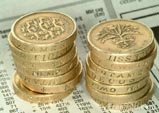Why the Government want you to sell your home
Thursday, 29 November 2007
 It's all about the money, or rather its about your money and the government making sure it gets a piece of the action. Every time
someone sells their home the government gets a nice large wad of cash sent their way from a tax called 'stamp duty'. Most people are
aware that moving home is expensive, but have you ever wondered just how much money goes to the government each time? Well, we wanted
to know how much they get so we decided to get the calculators out and start doing the sums.
It's all about the money, or rather its about your money and the government making sure it gets a piece of the action. Every time
someone sells their home the government gets a nice large wad of cash sent their way from a tax called 'stamp duty'. Most people are
aware that moving home is expensive, but have you ever wondered just how much money goes to the government each time? Well, we wanted
to know how much they get so we decided to get the calculators out and start doing the sums.
Stamp duty is the quaint old term for a 300 year old property tax. It's called stamp duty because the documents were physically stamped with an impression, and in fact they still are even to this day. The amount of tax varies depending on the sale price of your home and is payable buy the buyer.
These are the rates for 2006/7 (Source HMRC)
- Up to £125,000 - 0%
- Disadvantaged areas up to £150,000 - 0%
- £150,001 to £250,000 - 1%
- £250,001 to £500,000 - 3%
- Over £500,000 - 4%
The amazing thing about this tax is that the rate is absolute, you pay the appropriate rate of tax for the full amount, to explain further here are two examples:
Example 1
House A sells for £250,000 - the stamp duty due is £2,500
Example 2
House B sells for £250,001 - the stamp duty due is £7,505
So why does an increase in the selling price of £1 mean that an extra £5,005 is due in tax? The reason is that for house A sold at £250,000 the tax is only 1% of the total, once you add on that extra pound to sale price you fall in the higher band and have to pay 3% on the full amount.
House prices have increased relentlessly over recent years, so you would have expected the government to have increased the tax thresholds to keep things in balance. Lets take a look at what Gordon Brown (before he became PM) has changed with stamp duty:
1999 Budget
Stamp duty raised to 2.5% for properties in the £250,001 to £500,000 range
Stamp duty raised to 3.5% for properties over £500k
2000 Budget
Stamp duty raised to 3% for properties in the £250,001 to £500,000 range Stamp duty raised to 4% for properties over £500k
2005 Budget
0% threshold raised to £120k
2006 Budget
0% threshold raised to £125k
Hold on, this can't be right? Not only has Gordon Brown failed to increase the thresholds (with the exception of the 0% threshold) he has actually raised the amount of tax due for each threshold! You could argue that first time buyers will benefit from the increase in the 0% threshold, but property prices have risen so fast that many first time buyers are still having to pay stamp duty, especially in the South East where prices are higher.
With the rise of property prices and taxes there is one clear winner, Gordon Brown's government raked in £5.5bn in stamp duty for 2004/5 which increased to a whopping £6.4bn in 2006/7. It's a tax that affects many home owners, the Halifax say that one in four properties in the UK are valued at more than £250,000. If stamp duty thresholds had increased at the same pace as house prices then your house would have to be worth around £1.4m before you hit the 4% rate and £739k before hitting the 3% band.
So why do the Government want you to sell your home? With the massive increases in house prices we have seen in recent years stamp duty has turned out to be a very effective stealth tax. If you sell your home then a large amount of easy money goes direct to the Government.
What do we think? - we think that stamp duty needs to be revamped. While we would like to see it removed completely, we do accept that without it the money would need to be raised elsewhere (probably an increase on income tax). So we would like to see the following:
- 0% threshold raised to £175,000
- 2% tax payable on £175,000 to £500,000
- 3% tax payable on any amount over £500,000
We would also like to see the tax implemented in the same way as income tax, meaning that the first £175,000 would have no tax due on it regardless of the total selling price. The 2% would only be due on the £325,000 between £175,000 and £500,000. The 3% tax would then be due on any amount over £500,000.
Considering many experts believe we are now on the brink of a house price crash we feel that changes such as these would help to stimulate the housing market and could help prevent a crash.